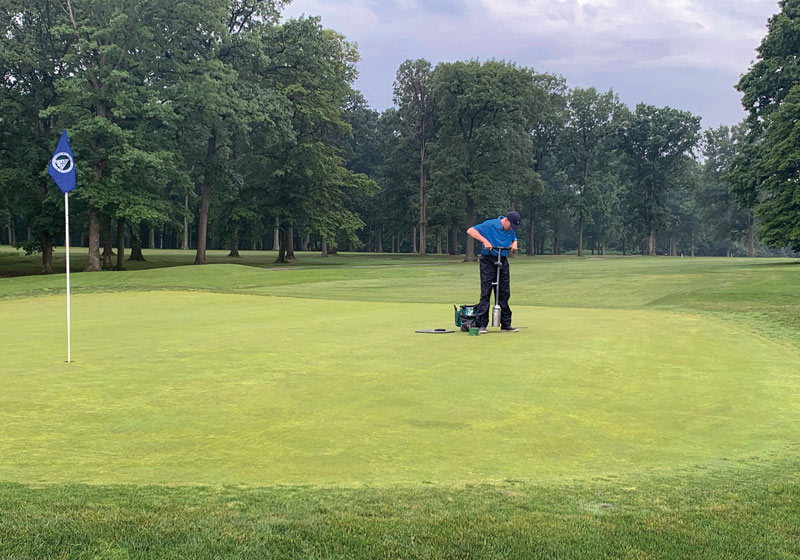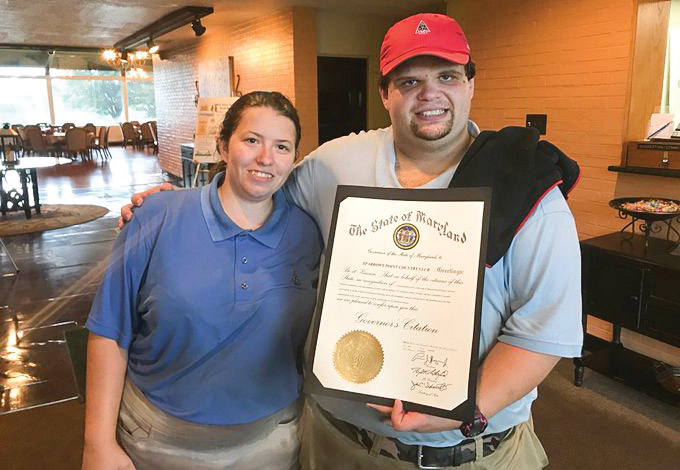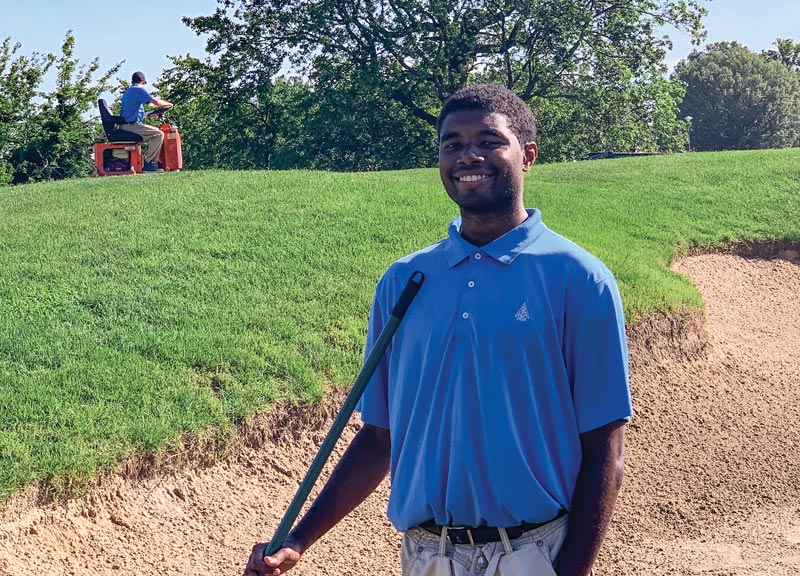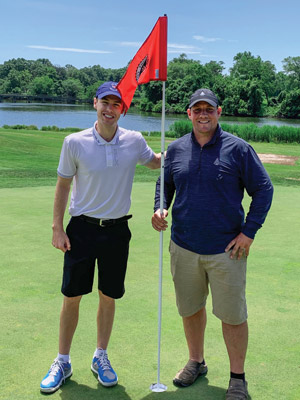
Sparrows Point Country Club in Baltimore is home to an 18-hole course and an “Inner 9” nine-hole course. Photos courtesy of Tyler Bloom
If you had to identify the ideal golf course maintenance employee, what characteristics would be most pivotal? Someone who is punctual and responsible? Someone who is engaged and passionate? Someone who is coachable and has a desire to learn and be part of a team?
In March 2018, a group of job candidates who possessed all of those traits fell into our lap here at Sparrows Point Country Club in Baltimore. The club — which features 27 holes of golf — had decided to host an on-site job fair as a means of interacting with prospective employees and showcasing our facility. The Arc Baltimore, an organization that works with local residents who have intellectual or developmental disabilities and connects them with meaningful employment, saw an ad for the fair in a newspaper and brought an enthusiastic, personable group of job candidates to our event.
Finding labor has been my No. 1 challenge since I became the superintendent at Sparrows Point in July 2014, and I realized that a partnership with The Arc Baltimore would not only be an opportunity to make a difference in the community, but that it could help address my recruitment struggles. What I didn’t realize at the time was just how much a job — particularly a job tending a golf course — could mean to individuals from The Arc, and the many ways their presence could lift our operation.
Welcome to the club
I currently have 10 full-time employees and up to 10 seasonal or part-time workers on my crew. Over the years, I’ve invested a great deal of time in building a strong workplace culture, and our department has evolved from a rather misfit group that lacked camaraderie to a tightknit team with a shared dedication to our objectives. This emphasis on culture was somewhat born out of necessity, as the golf facility at Sparrows Point isn’t the beneficiary of modern infrastructure or a prolific operating budget. Instead, through a highly engaged staff that takes pride in their work, we make platinum out of dust.
As I evaluated The Arc Baltimore’s potential fit with Sparrows Point, my initial thought was that our daily operations might be a little too complex and physically demanding. I was also a bit apprehensive about how my staff would interact with workers from the organization. Would such workers be able to keep up with my team’s pace? Would my core staff engage with them?
Those early concerns were quickly dispelled. What we found through The Arc Baltimore were two employees, Ariel and Jacob, who matched the criteria of our ideal team member. Both were seeking an opportunity to build their professional and personal skills, and our platform — the golf course — could certainly benefit from their drive to do good work and grow. Ariel and Jacob joined the maintenance team at Sparrows Point in April 2018, working four-hour shifts Monday through Friday.

Jason Wildt, an intern at Sparrows Point Country Club from the University of Maryland, changes a hole location on the seventh green in July 2019. Superintendent Tyler Bloom has created a robust internship program for both high school and college students, which has helped curb crew member turnover.
The steps to welcome Ariel and Jacob into our operation — proper training, consistent communication, building trust and accountability — were no different from those for any other new employee. The Arc Baltimore provided a job coach who accompanied Ariel and Jacob during their first weeks at Sparrows Point. The Arc’s goal is to gradually transition employees to on-the-job independence, working closely with them during the onboarding process and then stepping back as the employee becomes integrated into the workplace.
While the job coach’s top priority was assisting Ariel and Jacob, her expertise was an asset to us too. She helped us understand Ariel’s and Jacob’s cognitive skills and how their disabilities may present, and offered guidance on the best ways to communicate with and train them. This effort to “learn” our new employees wasn’t much of a departure from our usual approach either, as getting to know an individual’s strengths is what lays the groundwork for bringing out the best in them.
The buddy system
Ariel and Jacob excelled at duties such as raking bunkers, blowing clippings from playing surfaces, picking up debris, and basic landscape bed maintenance — essential tasks at any golf course. Having structure to their workdays was important to Ariel and Jacob, and eliminating distractions such as phones, chat sessions or working in large groups helped them focus. Repetition and familiarity with their duties were other keys to their success. For both, this was their first job where they were considered a crucial part of the team and held accountable for outcomes. We found that giving them directions and then supplying written instructions for reassurance allowed them to tackle their assignments confidently and led to consistency in their work.
Communicating with my staff was another important part of bringing Ariel and Jacob on board. When Ariel and Jacob felt included, their productivity and performance improved. When they felt isolated from my other crew members, they seemed to lose sight of their role within the operation.
Some employees were slower than others to recognize that they needed to take initiative when working with Ariel and Jacob, so I looked for ways to engage the whole team in creating a more inclusive work environment. I designated leaders on my crew to be Ariel and Jacob’s go-to references, which made seeking clarification or help easier for Ariel and Jacob, and empowered the more senior employees to take on mentorship roles. (The Arc Baltimore valued this “buddy system” strategy and has since recommended it to other employment partners.) In addition, I tried to impress upon my staff that training, coaching and motivating entry-level employees like Ariel and Jacob was an opportunity for them to take further ownership of our operations, and it would help them develop their own leadership skills.
I also made sure Ariel and Jacob participated in all the same procedures as my other employees. They were required to attend morning meetings, watch safety videos and clean up in the shop. I included them in the same feedback channels, where they were part of team dialogue and could share their input.

Ariel and Jacob, members of the Sparrows Point Country Club maintenance crew in 2018, display the governor’s citation the club received in recognition of its work to provide inclusive employment opportunities for Maryland residents with disabilities.
As the weeks passed, Ariel and Jacob thrived, and my staff came to embrace them as integral parts of our team. We were able to identify areas for growth in Ariel and Jacob’s job responsibilities, and, along with their blossoming golf course maintenance skills, we worked with them on “soft” skills such as accountability, being observant, and balancing courteousness and socializing with productivity.
As the 2018 season and Ariel and Jacob’s time at Sparrows Point wound down, I felt ashamed I’d ever had doubts about whether they would fit into our operation. Employing them proved to be a home run for the club, and hearing the excitement and pride in their voices when they’d talk to the job coach or their parents after a successful day at work was especially rewarding. As gratifying as it is to get compliments from members on course conditions, for me, nothing compares to my employees being happy.
Discovering new opportunities
We continued our partnership with The Arc Baltimore for our 2019 season, filling one crew member position from the organization’s talent pool. At the time, we had an employee who was not affiliated with The Arc but who had informed us he had a learning disability. This employee became ingrained in our operations, serving as a great complementary player while also taking the lead on certain duties.
At times, we’d see lapses in this employee’s performance that we discovered were tied to his disability. We were committed to helping him grow, and thanks to our relationship with The Arc, we already had a support system in place. As the job coach from The Arc spent a great deal of time with The Arc’s employee during his first couple of months, she also formed a connection with our gentleman. Gradually, she was able to peel back for us the layers surrounding his work-related challenges, giving us a far better understanding of him, which in turn helped us facilitate his success at work. Through his newfound relationship with The Arc, our employee was able to get professional support he’d never had access to before. His work improved, and he became a mentor to the new Arc employee. Their rapport helped both grow more comfortable.
As our partnership with The Arc Baltimore has progressed, I’ve learned how Sparrows Point can best serve The Arc’s needs, and, vice versa, The Arc’s team knows the skills and traits we’re seeking in employees. In 2020, we’ll have a worker from The Arc’s landscaping division — which trains employees on the safe operation of equipment — join our crew. This new team member will pitch in on mowing, planting, weeding, raking and pruning throughout the club’s grounds.
Lessons learned
Reflecting on the past two years, I’ve made note of some things I wish I’d known or done differently at the outset. These lessons can hopefully help other superintendents who may consider working with an organization like The Arc.
First, I would have established a stronger connection with The Arc’s job coach right from the start. Ariel and Jacob were sometimes afraid to interact because of fear of others’ opinions — mostly my own. The job coach is a trusted partner for both parties and can relay back to me my shortcomings as an employee’s manager. Better leveraging the job coach’s expertise and her relationship with the employees would’ve likely streamlined the employees’ development as well as mine as their supervisor and my team’s as their colleagues. I would have also required The Arc to become more familiar with our policies and procedures, as I think that would have led to a smoother orientation process for the employees as well.

Launching pad: Antwan Askia, a part-time member of the grounds crew at Sparrows Point Country Club since 2019, is pursuing a law degree.
At times, stresses from outside of work can creep in and affect us in our jobs. My observation was that such stresses affected my staff members from The Arc more. Similarly, it was heartbreaking to have to correct them on something, as they tended to dwell on such feedback and get down on themselves, which could send them down a gloomy internal path. Building up confidence after a pitfall was by far my hardest task. I consider myself to be a motivational communicator, and it was humbling to fall short of my own standards and have an employee who was unable to get out of a funk.
In hindsight, I would have leaned on the job coach for guidance on how to be empathetic while still continuing to challenge the employees. Simply being mindful of the potential for a heightened emotional toll was the first step, and then incorporating strategies such as listening attentively to the employee, keeping things in perspective, and reinforcing that setbacks are not insurmountable helped us ensure we were showing them care and respect.
Finally, there are many state and federal laws that protect individuals with disabilities, and you need to educate yourself and club leadership. Be thorough — cross your t’s and dot your i’s in every interaction, and document. Learn as much as you can about the employees and how they experience the world. We often think of people with disabilities as a single population, but it’s a highly diverse group with a range of conditions, and two people who have the same disability can be affected in very different ways.
The benefits of inclusiveness
By no stretch do we have a perfectly oiled machine here at Sparrows Point, but working with The Arc has benefited the club in many ways. On the operations side, the partnership has given us a fresh perspective on our onboarding practices. We’ve refined our approach to focus more on learning the individual, gathering insight on what they need to do their best work. We’ve also expanded the “buddy system” into a team-wide mentoring initiative. Every new employee is paired with a tenured, high-performing employee, with the goal being to make learning the ropes easier and to instill a high standard of workmanship.
For our staff members from The Arc, the partnership has given them the opportunity to participate in a life role — employment — and enjoy the dignity and many other dividends that come with that. The experience has also been life-changing for me. I’ve been privileged to benefit from the game of golf, and sharing my passion for the sport with others has always given me great satisfaction. However, being able to, through golf, provide a community for people who are searching for belonging and purpose is rewarding in an entirely new way. I have come to reappreciate many of the little things within our profession that I’d begun to take for granted — things like getting to work with Mother Nature, team camaraderie, operating equipment and zeroing in on details. These were the aspects of their jobs that The Arc employees loved most.

Right: Author Tyler Bloom (right), director of grounds and facilities at Sparrows Point Country Club, on course with golfer Evan Joyce.
It’s hard to pinpoint one moment that has been the most rewarding. For me, it has been a culmination of daily victories and seeing employees progressively gain confidence, pride in their work, and a sense of belonging and community. Championing inclusiveness at Sparrows Point has propelled our operations forward, and we take pride in having diversity on our staff in many respects — gender, race, age, ability. What we may lack in glitz and glamour, we surely overcome with our inspired, inclusive workplace culture.
Recognition was never the club’s intent, but in 2018, the state of Maryland presented Sparrows Point with a governor’s citation for its efforts to improve inclusive work opportunities for residents with disabilities. To the best of our knowledge, we are the only golf course that has received this honor.
Golf courses have a unique way of bringing people together, and we as golf course superintendents can directly impact our communities and the larger world through the people we welcome to be part of our teams. There are job placement firms like The Arc Baltimore throughout the country striving to get qualified, hardworking people into industries like ours. While this story is one of inclusiveness, it’s also about a workforce solution. The labor challenges the golf course maintenance industry is facing will not go away through traditional means. I encourage any golf course operation to consider opening its doors to employees with different abilities or who may not otherwise fit the “traditional” mold. They may be just the assets you’re looking for.
Tyler Bloom is the GCSAA Class A director of grounds and facilities at Sparrows Point Country Club in Baltimore. A nine-year member of GCSAA, he has served on the board of the Mid-Atlantic Association of Golf Course Superintendents and is a GCSAA Grassroots Ambassador. Bloom graduated from Penn State University in 2009 and has worked at golf courses in Ohio, Oklahoma and Pennsylvania, including Oakmont Country Club, Merion Golf Club and Muirfield Village Golf Club. He lives in Baltimore with his wife, Jayme, their daughter, Lennon, and chocolate Lab, Hayley.